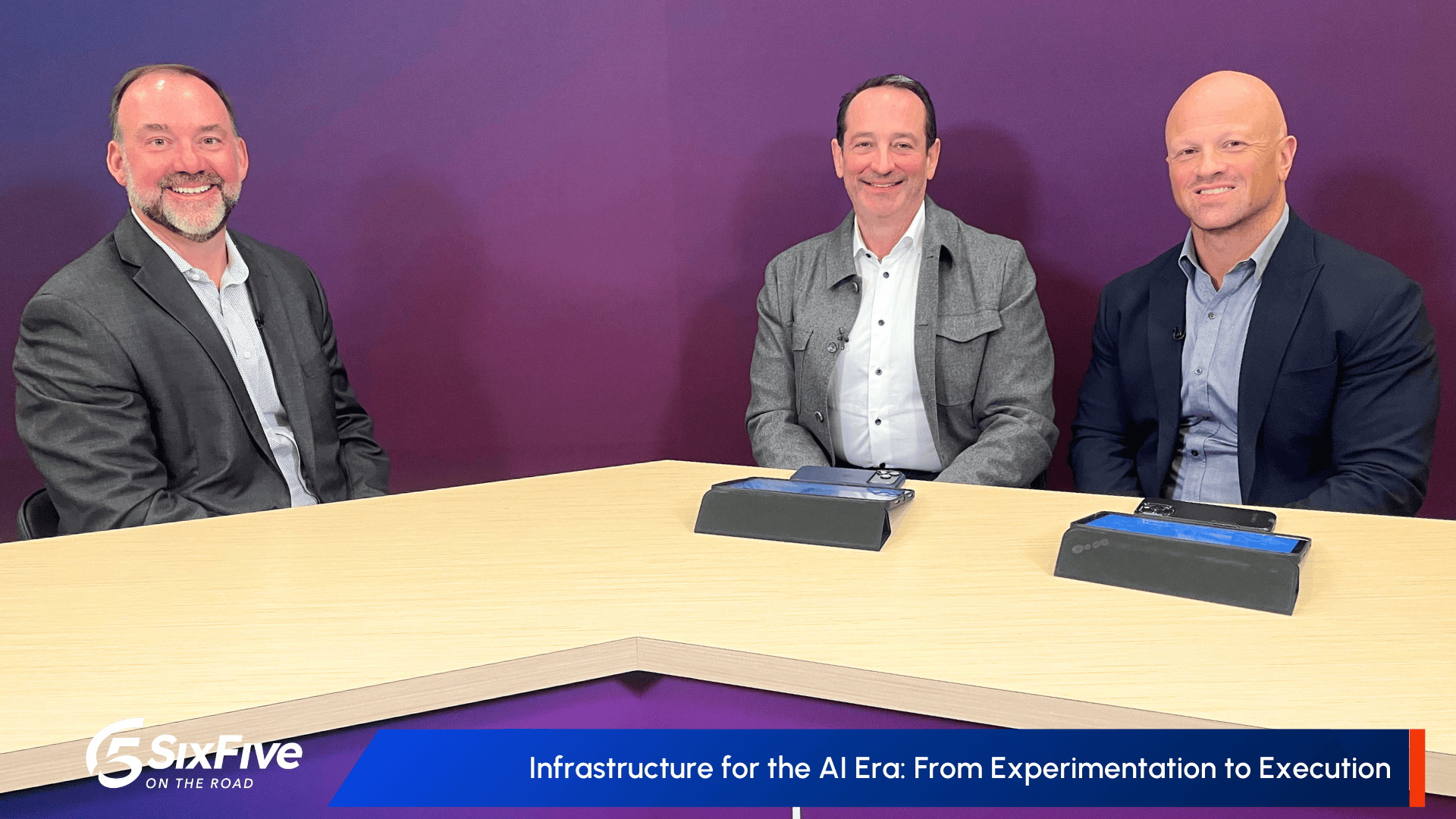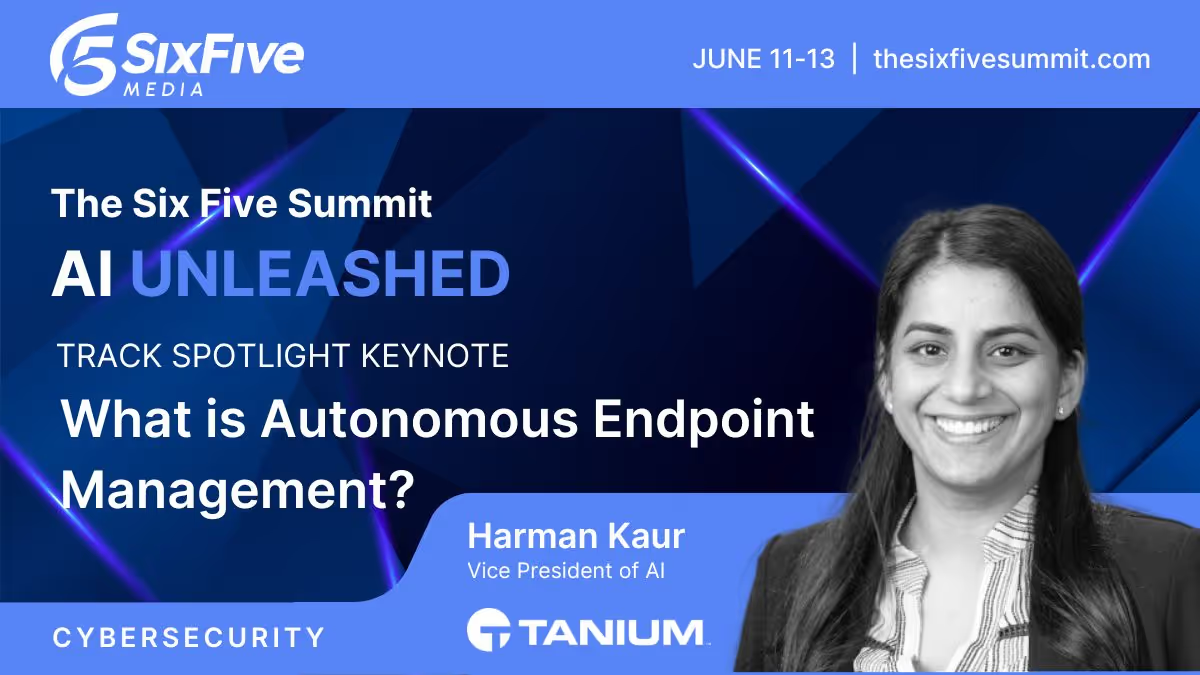Jeetu Patel on What’s Really Holding AI Back - Six Five On The Road
Jeetu Patel, President & Chief Product Officer at Cisco, joins Melody Brue to analyze what’s slowing AI adoption for enterprises—from infrastructure hurdles to leadership concerns—and what could change over the next five years.
Is enterprise AI innovation being held back more by technology? Or is the issue trust and leadership readiness?
Host Melody Brue is joined by Cisco's Jeetu Patel, President & Chief Product Officer, for a conversation on what’s really holding AI adoption back in the enterprise, including the often-overlooked challenges of infrastructure, security, and data maximization.
Key Takeaways Include:
🔹Infrastructure bottlenecks: Many organizations face serious hardware and software constraints that limit their ability to scale advanced AI solutions.
🔹Security and the trust gap: As AI introduces new attack landscapes, leaders must confront larger, more complex trust challenges than ever before in cybersecurity.
🔹Untapped potential in machine data: The vast majority of machine-generated data remains underutilized. Unlocking its value may distinguish future winners in enterprise AI.
🔹Executive sentiment: Leadership attitudes toward AI range widely from enthusiasm to skepticism and even fear, often varying by industry and executive style.
🔹The next era of AI: Over the next 3–5 years, enterprise AI could become just as ubiquitous, and even as expected, as cloud. Though shifts in adoption and trust will shape that trajectory.
Learn more at Cisco.com
Watch the full video at sixfivemedia.com, and be sure to subscribe to our YouTube channel so you never miss an episode.
Or listen to the audio here:
Disclaimer: Six Five On The Road is for information and entertainment purposes only. Over the course of this webcast, we may talk about companies that are publicly traded, and we may even reference that fact and their equity share price, but please do not take anything that we say as a recommendation about what you should do with your investment dollars. We are not investment advisors, and we ask that you do not treat us as such.
Melody Brue: Hello, welcome to Six Five On the Road. I'm Melody Brue with Moor Insights and Strategy. I am joined today by Jeetu Patel who is President and Chief Product Officer at Cisco. Thanks for joining me.
Jeetu Patel: Thank you for having me, Melody.
Melody Brue: Yeah.
Jeetu Patel: Good to see you.
Melody Brue: Nice to see you.
Jeetu Patel: Say hi to my friend Patrick.
Melody Brue: Will do that. You just did. So I want to start by just talking about a kind of general observation that I've had. Hearing you talk, hearing other leaders at Cisco talk about AI and how it's being approached at a very human centric level. And I see that throughout the way that you talk about people, the way that you talk about jobs, the way that you talk about products. So contrasting with some fear out there about AI and what it's going to do to jobs, also some adoption barriers. How do you take that approach? It's a very positive approach and I love actually hearing you talk about it. So excited for this conversation but it's certainly trickling down throughout the organization and I see it where in features and product, in culture. So how do you share with us a little bit about that?
Jeetu Patel: I think, I think you nailed it, which is I think the biggest opportunity that we have and the biggest challenge that we have is the cultural shift that's going to be necessary for AI. And in my mind, this kind of argument that, you know, humans have reached their end of being able to add value to society because AI has come about, now we're all just going to be sitting on a beach staring at the ocean just seems absurd because there's so much creative contribution that humans can make or what humans are really good at. But that doesn't mean that every job won't get reconfigured. Every job will get reconfigured. Every job will be done very differently. Some jobs won't exist, other jobs will get recreated, but humans will. The one baseline assumption I have is humans will always have value to add to society. That's number one. Number two, as you think about the value that we add to society, I think it's very important that we keep in mind that there's this narrative that, okay, if all entry level jobs are going to go away, so you don't need to hire people that are coming in fresh into the workforce because there's going to be no jobs for them. I find that concept pretty absurd as well because I do feel like the new injection of talent is what actually keeps flowing new ideas and discontinuous thoughts into your organization. So if you stop hiring people early in your career I think your company suffers in a far greater way than just the job that they might be doing because actually they tend to expand and extend the culture. Now, where I feel like we are, I tend to focus my time on being very intentional, on the muscle memory that needs to be developed where AI becomes a part and parcel of how we operate and function and get our jobs done. And if, let's say, I'm very open with this with my team, those of us that choose not to use AI to reimagine how our jobs can be done will in the long run not be good fits for Cisco. Whereas those of us that actually get very creative with the use of AI will not only be great fits for Cisco, but you will actually create more opportunity because it's like there's a compounding effect if each one of us gets to be 10 to 50x more productive. I have plenty of ideas that go unprosecuted because of a lack of resources that we can actually now start to go out and prosecute. And that's going to be good for our customers, that's going to be good for the ecosystem, that's going to be good for Cisco, that's going to be good for our partners, so on and so forth. So I do feel like this kind of zero sum mentality that we look at this with isn't particularly useful, at least for us. What works for us is let's make sure that we actually are the world's leader in the use of AI. And if we can do that well, you will actually grow the scale of impact that we can have. And that scale of impact will have ripple effects that are going to be very positive.
Melody Brue: And so while you're using AI internally, you're also surfacing AI in ways that people can use it, where they may have that fear of using it that makes it so that it doesn't feel like you have to have some skill to use it. It's actually quite accessible.
Jeetu Patel: We are, we're creating a baseline expectation that says you must actually have your job, be instructed with AI in any job that you're in. You happen to be in legal, you happen to be in accounting, you happen to be in customer support, you happen to be a developer, you happen to be a product manager, you happen to be a designer. We expect you to use AI in your day to day lives, and we expect you to use it so that you can get better, not necessarily always faster, but you can get meaningfully better at solving problems that we might have not thought were solvable. And if we can do that, we will just be a better company. And if we are a better company, that's our job, is to make sure that we leave Cisco a better place than what we found it.
Melody Brue: And as you do that internally and people using AI more internally, how does that translate to customers using AI and bringing them along in that journey?
Jeetu Patel: We actually did a study recently where we asked our customers, how many of you are using Agentic AI? And 80% of them said that they were using Agentic AI. 4 out of 5. And then 2/3 of them said that they were seeing that agentic AI was meeting or exceeding their expectations. Two thirds, right. But what we found was the people that were actually getting the most amount of value from AI were ones who had started experimenting early. And so in my mind, the way to think about this is don't sit on the sidelines, don't wait for this to get better so you can start using it. Start using it right away, you know, and in that way, I feel like there's going to be a material compounding effect that can be had if you can start using these capabilities because you have to form a level of judgment, a level of instinct, and understand the texture of what this looks like. And if you don't have that, then you're going to be out of touch. And that, I think, is a very important part of how you have to approach these problems. And the way that we do it is if you don't know how to use it internally for your day to day, you're not going to be able to build great products for your customers to consume. So it's almost a prerequisite that if you don't use it daily and get an instinct for it, how are you going to build products that other people are going to get an instinct for? It just won't work.
Melody Brue: I agree with that completely. Even when ChatGPT was banned in schools, I told my kids, you have to be using it. It was almost like a mandate in my house that they had to become familiar with it. Let's shift a little bit to more of the technical side. We hear a lot about breakthroughs in AI models, but less about the strain that that puts on the system. So how much of the slowdown in AI is about infrastructure limits and how are you addressing that?
Jeetu Patel: I actually think right now, by the way, I don't feel like there's a slowdown in these models. I think they're actually moving at a pretty rapid pace. Just yesterday, for example, CloudsonNet 4.5 came out and they had a 30 hour duration of autonomous execution. 30 hours, like most agents in the past, have been 20 minutes long. This is going to take 30 hours by itself. And that's going to have a material compounding effect. Right. And so I don't think it's a slowdown, but I think there is a meaningful constraint on infrastructure. We don't have enough power, we don't have enough compute, we don't have enough network bandwidth to satiate the needs of AI globally. And so the way that this is going to work is in fact, I would say OpenAI has, I don't know, 700, 800 million at this point, probably weekly active users. You know why? They're not 1.4 billion or 2 billion. They just don't have enough infrastructure to serve it. It's not a demand constraint, it is purely a supply constrained industry. And so we just have to make sure that we provide ways to kind of overcome these infrastructure constraints. Because on one end, AI is going to create an abundance of resources that we have never experienced before. We've always lived in a world of scarcity. We're going to start living in a world of abundance. On the other end, the scarce part of creating that abundance is infrastructure.
Melody Brue: Yes.
Jeetu Patel: Is trust, is the data gap. Those are the things that have scarcity.
Melody Brue: Yeah, that's a great way to put it. You've talked about that. One of the biggest challenges in AI is security. So how are you addressing that? What does it mean in practice? What is Cisco doing with it?
Jeetu Patel: So I think the reason I say safety and security are big challenges is these AI systems are built on models. These models are by definition what they call non deterministic or unpredictable. And you're trying to build predictable systems in the enterprise on top of unpredictable models. And what do unpredictable non deterministic models mean? It means that every time you ask it a question, it might give you a slightly different answer. It means that sometimes you don't know what answer it's going to give you. It means that these models can be tricked, they can be jailbroken. And so the more we can provide a way to go out and have visibility on the data that these models are going to have flowing through them, have a mechanism to validate the model, to say, is the model working the way that we think it should work? In those scenarios where it's not working the way that we think it should work, we can dynamically apply guardrails at runtime so that not every person building an agent or an application has to become an expert in security, but you just call an API and incorporate it into your app and you don't have to rebuild the security stack every single time. By the way, this is no different than how the SaaS industry evolved. There was a certain set of capabilities of the SaaS industry built within each one of their products. And then there were industries that were formed that just provided security on top of these SaaS products. And that became a common substrate of security that went across every SaaS application. In a similar way, we think there should be a common substrate that goes across every model, every app, every agent, because these models are changing so fast that most people don't know which one to bet on. So they're going to want to bet on a multitude of models, and as one gets better, they're going to want to use that. So you need to have flexibility in your choices of infrastructure that you're using for AI, and that requires that you build this thing. So what we've done is we built a product called AI Defense that essentially allows for that visibility, validation and runtime enforcement of guardrails with AI defense. And that's something that we expect will eventually happen. It'll be irresponsible not to use something like that while you're actually building out your applications.
Melody Brue: So you talked to enterprise leaders. You probably ran into several of them on the way here. What are some of the big concerns that you're hearing in the industry? And also what are the things that people are really excited about AI leveling up their business?
Jeetu Patel: I think the impediments are around infrastructure, a trust deficit and a data gap. There's also a skills gap. And so that's the other thing that's needed, is you need to have both of those. In addition to that, I feel like it's very easy in AI to build prototypes. It's very hard to build applications that actually can achieve business outcomes. And so we need to make sure that we actually start to do that in a more effective way. And I feel like right now what customers are concerned about is, hey, can I get those impediments out of the way? Infrastructure, trust and data. That's great. Cisco, by the way, turns out, happens to help in all of them. There's also a desire to make sure that there's upskilling that's happening for all of the people within your organization. And then there's a matter of, like, when I build something, can I actually get it to adoption? Can I actually get it to business outcomes that we've identified? Because in the absence of that, it just becomes a science project. And so be skeptical of the demos you see and be very, very attached when you start seeing real results because those are not going to be easily replicable.
Melody Brue: That's a great point because we see a lot of demos that look really slick.
Jeetu Patel: They look slick, but they might not actually always work in real life environments. That's why one of the things that we do in these events as well, like you were there at WebEx1 today and you saw the event. What we will do is we will show live demos. And I think it's okay to show the imperfections, it's okay to show the glitches because that tells you that the product's actually working and it's getting better over time. But don't get something that's overly manufactured and doctored because it's not authentic.
Melody Brue: And then it doesn't end up performing the way that you want it for the purpose to perform. And it becomes a frustration.
Jeetu Patel: Exactly right.
Melody Brue: And there is a lot of talk about upskilling and how do we get people there. But the reality is using the product, being hands on, starting with small things, those are all things that will upskill you kind of naturally. Right. How do you look at, you know that when you're introducing a product, whether it's an observability product or a collaboration product, at what level do you expect that users will be able to just get it and be familiar with it and use it, versus how much do you think you have to kind of do bring the customer along that journey?
Jeetu Patel: I think as new categories get built initially, you might actually have some education that's needed, like observability. I'll tell you this, everything from utilization of a GPU to how a model performs, to how the tokenomics work, and what's the ability for an organization to create tokens that are most efficient per dollar per kilowatt hour used? I think those are all areas that you need to have visibility into. And so observability should provide you that entire end to end spectrum. Not everyone has identified that that is a need yet. And so as you show people the possibility, they get excited about it. But not everyone's actually identified that because I think the market's moving too fast. And one of the things that we have to do is the education for the industry is just as important as the actual build out of the capability.
Melody Brue: So as you see this evolving over the next, let's say three to five years, things are moving really fast. Do you see AI more baked in like the way that we experience clouds now or do you still think that it's. It's really hard to tell. Right. You say, you know, last year we were talking so much about just AI and then it became AI and so what do you see next? What do you do?
Jeetu Patel: So I think like there's always going to be the next, you know, concept and breakthrough and step function improvement that comes about. But what we think today is novelty. Humans have an amazing ability to compress the time within which they get used to something that seems like magic, that becomes a normal course of action every day. Right. I mean, think about when you use Waymo. The first time in San Francisco, a fully self-driving car, you get it in the backseat, there's no other driver, it takes you from point A to point B. You think it's completely like you're living in the future. The second time you go into a Waymo, you start complaining about your seat a little bit. Third time you're like doing email and don't even think about it. And that's, I think the thing is we have a remarkable ability to get adjusted to whatever is the norm. That's why when people ask, "When is AGI coming? In some definition we're already at AGI. Right. In other definitions you will never have AGI because people's, it's a, it's a kind of moving target that it's going to keep moving as you get more and more used to what's happening.
Melody Brue: One of the things that you said actually early on was that it won't be, this won't be just about how people work with people or how agents work with agents. It's how people work with agents that there's that combination that we're all going to have to kind of start to get used to.
Jeetu Patel: Yeah.
Melody Brue: When do you see that happening? And what do you, what advice would you give to leaders who are grappling with like, how do I get people to work with agents? And how do I, how do I trust that the agent talking to the agent to the person is that information is solid?
Jeetu Patel: Where I think it goes back to the cultural shift that we're talking about. I think there's. Right now our workforce has largely been people talking to people. In the future you'll have a workforce where people will actually need to talk to agents and engage with agents. And so each one of us will be a manager of agents and then there will be agents across different products that will have to interact with each other. So that they can solve problems for us. And I feel like that notion of making sure that you have the ability to have people talking to people and that gets to be effectively handled, people talking to agents, and you actually have a whole family of agents that are going to provide that transformative effect. And then you're going to have an open ecosystem of agents that talk to each other and exchange data, of course, securely and with authentication. But that'll happen. And so in my mind, those three pieces together, when you combine them, that's what we talk about as this notion of connected intelligence, where you will always be. You know, the intelligence will continue to compound and that connectivity will continue to compound for those different entities talking to each other. And I feel like we are in the early days of that. Over the course of the next year, you will see meaningful progress made in that dimension. Over the course of the next two years, you will wonder how you lived without that as a base assumption of society.
Melody Brue: Yeah. Well, I look forward to watching that journey and your journey, and I really appreciate the time to chat.
Jeetu Patel: Thank you for having me on the show.
Melody Brue: Yeah, my pleasure. And thanks for tuning in to this episode of Six Five on the Road. I'm Melody Brue here with Jeetu Patel from Cisco. And thanks for tuning in. We'll see you next time.
MORE VIDEOS
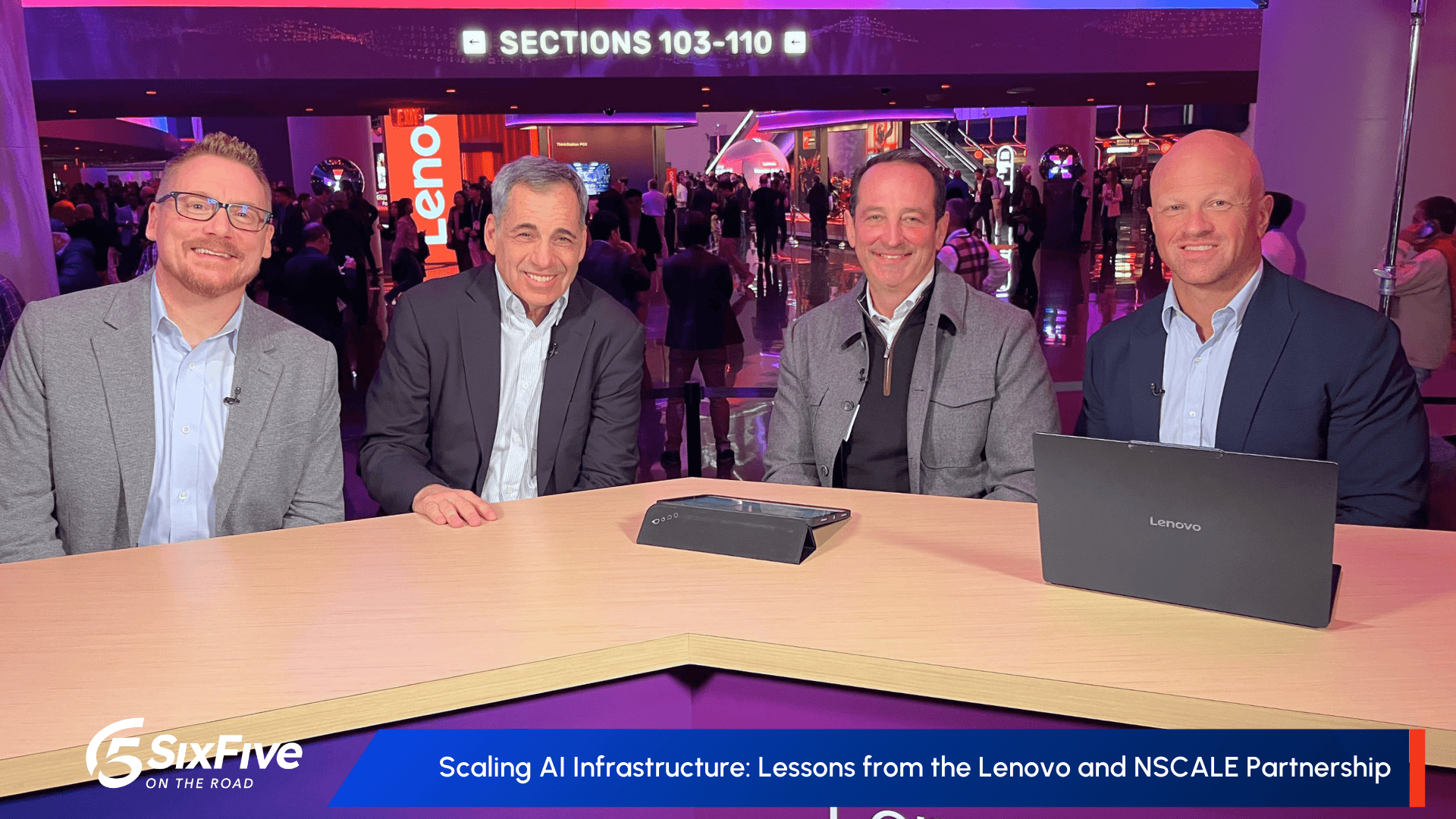
Scaling AI Infrastructure: Lessons from the Lenovo and Nscale Partnership - Six Five On The Road
Patrick Moorhead and Daniel Newman are joined by Lenovo’s Conor Malone and NSCALE’s Stu Pann to discuss the real-world challenges of scaling AI infrastructure from pilot projects into production environments.
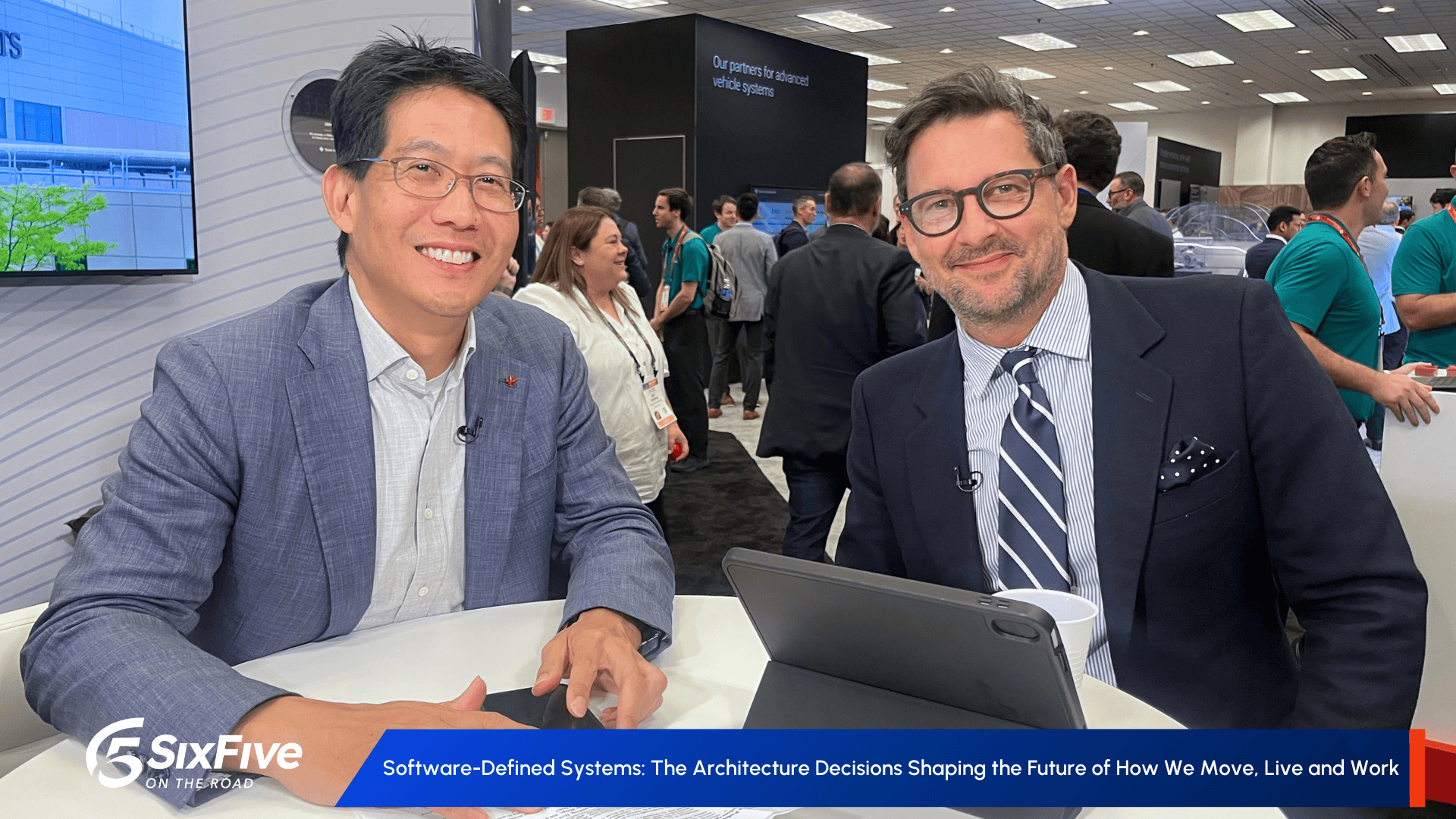
Software-Defined Systems: The Architecture Decisions Shaping The Future Of How We Move, Live And Work - Six Five On The Road at CES 2026
Mark Ng of Texas Instruments joins Six Five On The Road at CES 2026 to discuss how software-defined architectures, real-time intelligence, and semiconductor design are reshaping vehicles and other intelligent physical systems, and why long-term architectural decisions now matter more than ever.
Other Categories
CYBERSECURITY
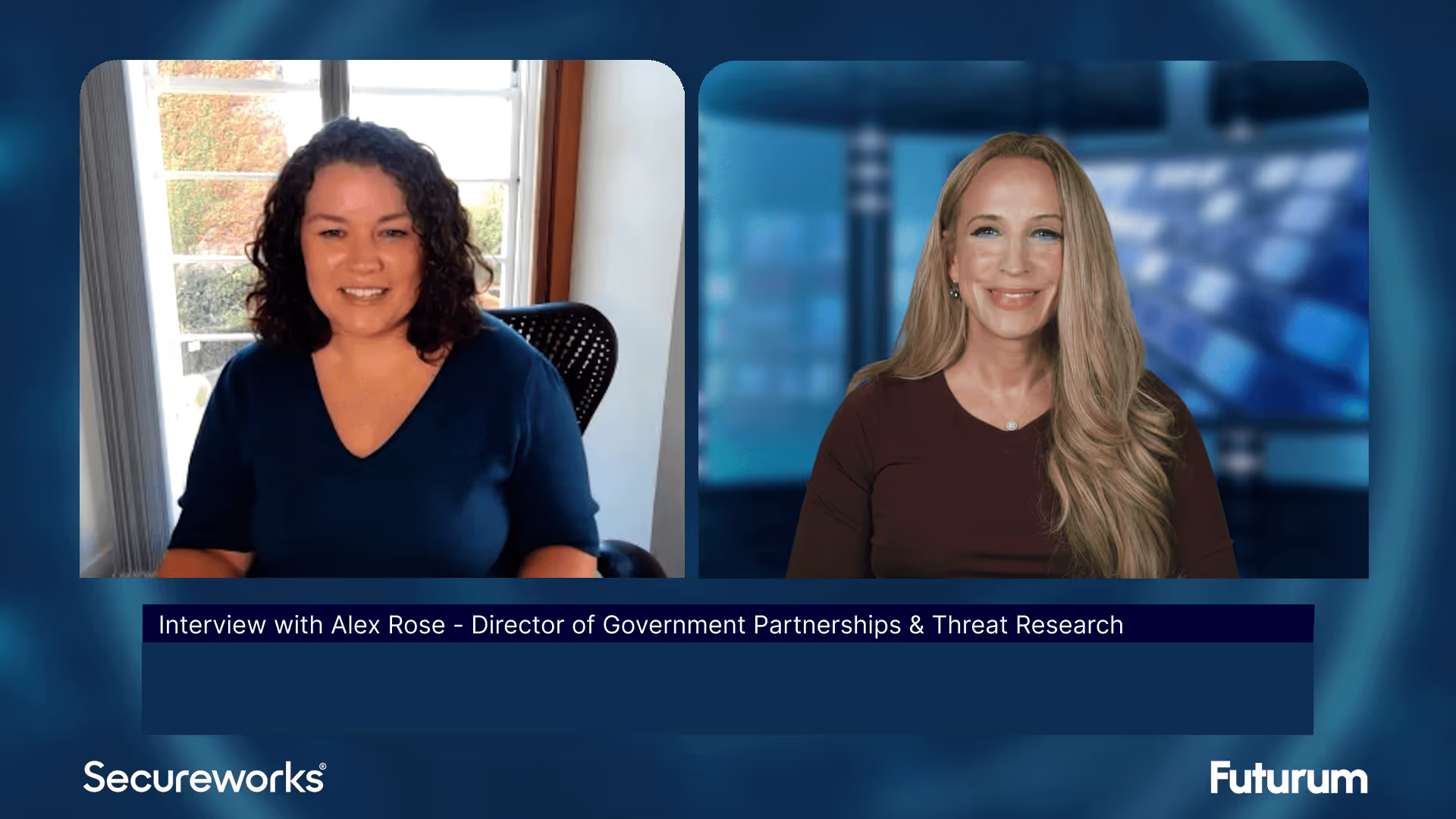
Threat Intelligence: Insights on Cybersecurity from Secureworks
Alex Rose from Secureworks joins Shira Rubinoff on the Cybersphere to share his insights on the critical role of threat intelligence in modern cybersecurity efforts, underscoring the importance of proactive, intelligence-driven defense mechanisms.
QUANTUM
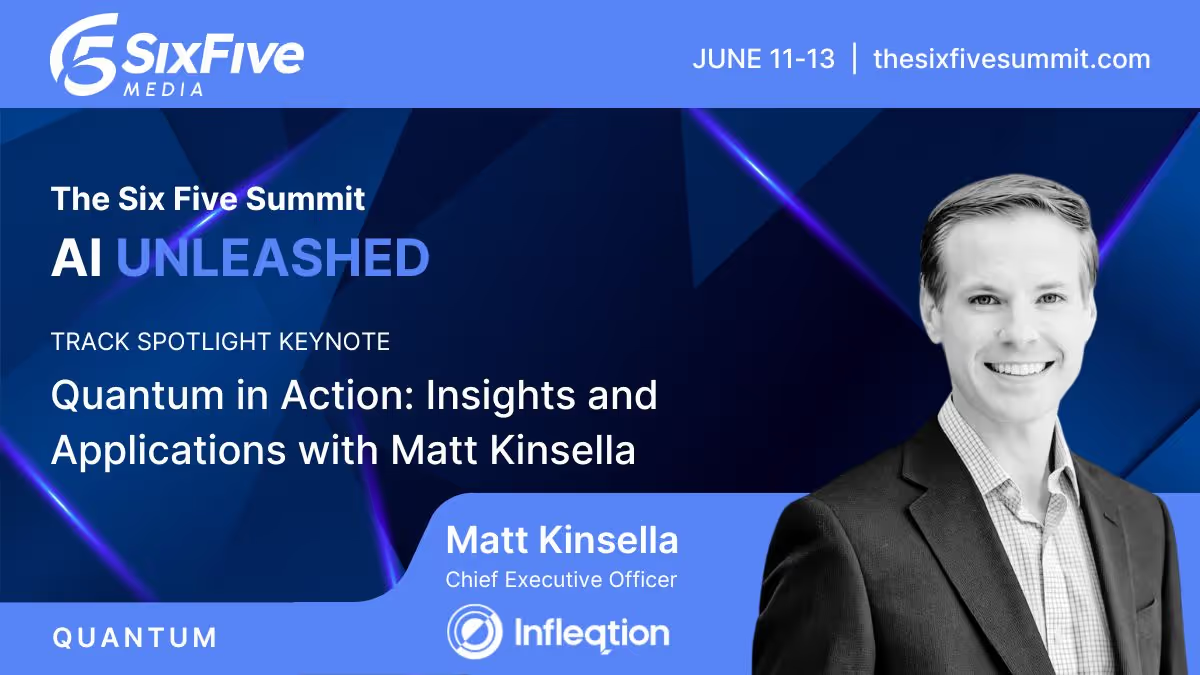
Quantum in Action: Insights and Applications with Matt Kinsella
Quantum is no longer a technology of the future; the quantum opportunity is here now. During this keynote conversation, Infleqtion CEO, Matt Kinsella will explore the latest quantum developments and how organizations can best leverage quantum to their advantage.
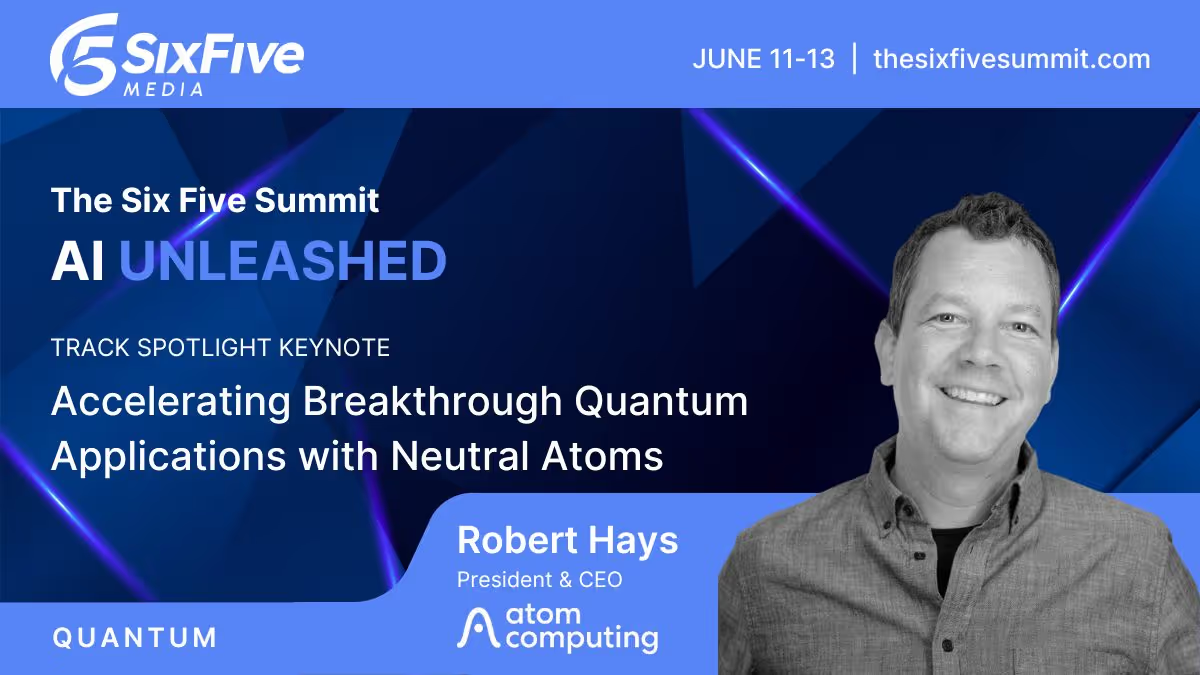
Accelerating Breakthrough Quantum Applications with Neutral Atoms
Our planet needs major breakthroughs for a more sustainable future and quantum computing promises to provide a path to new solutions in a variety of industry segments. This talk will explore what it takes for quantum computers to be able to solve these significant computational challenges, and will show that the timeline to addressing valuable applications may be sooner than previously thought.



